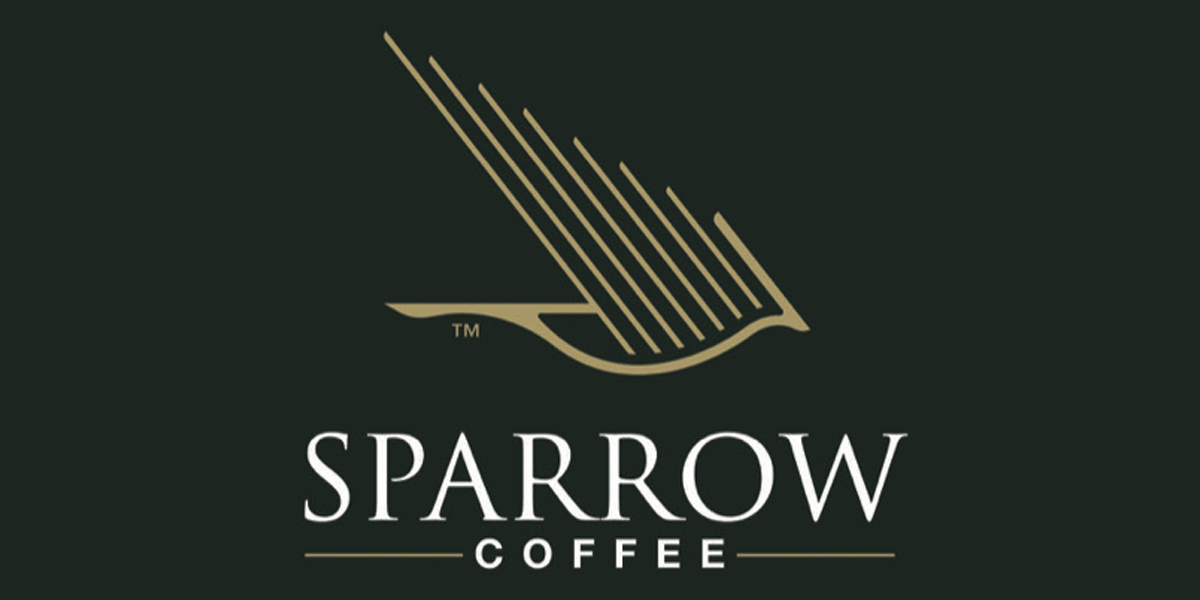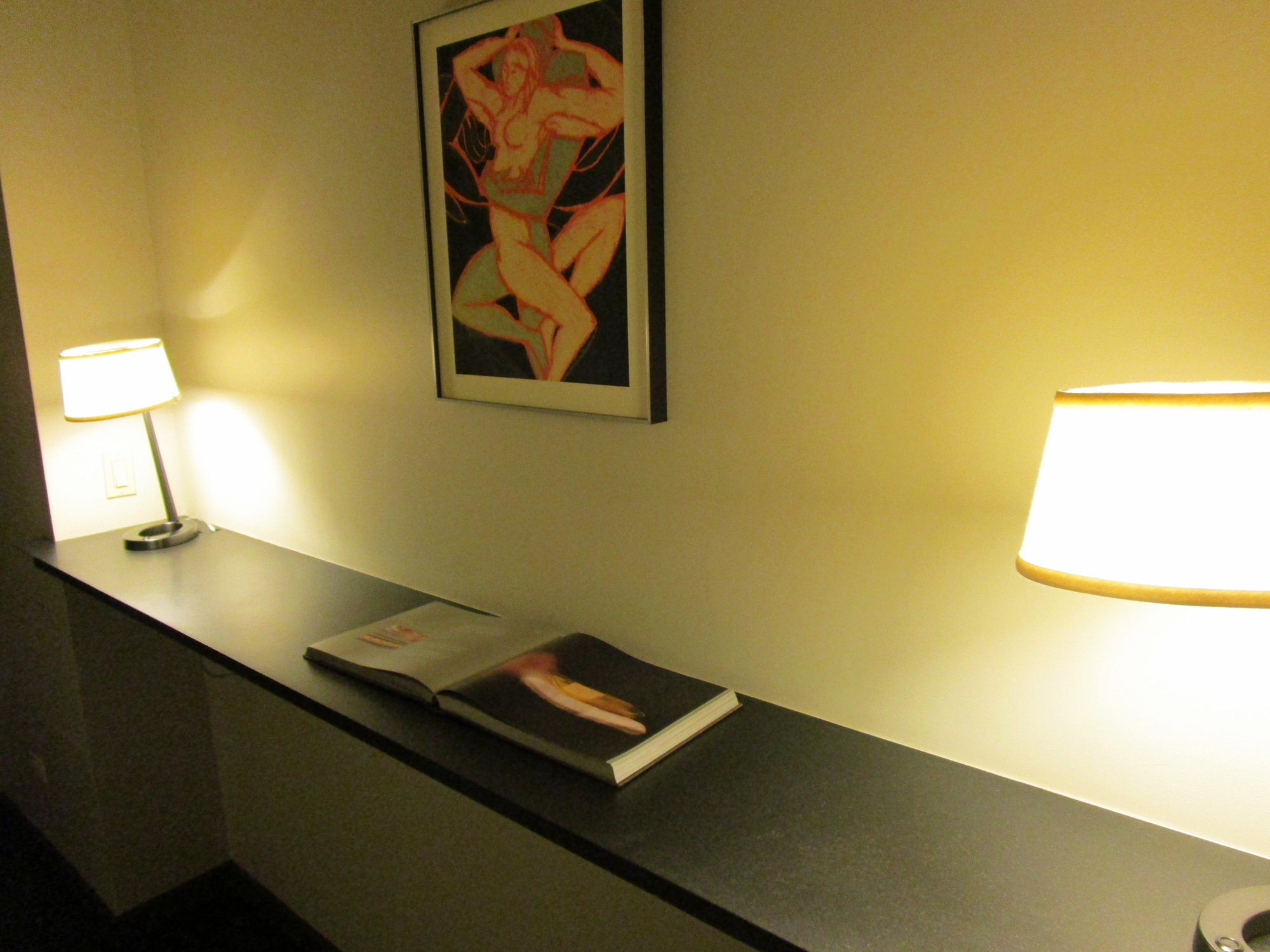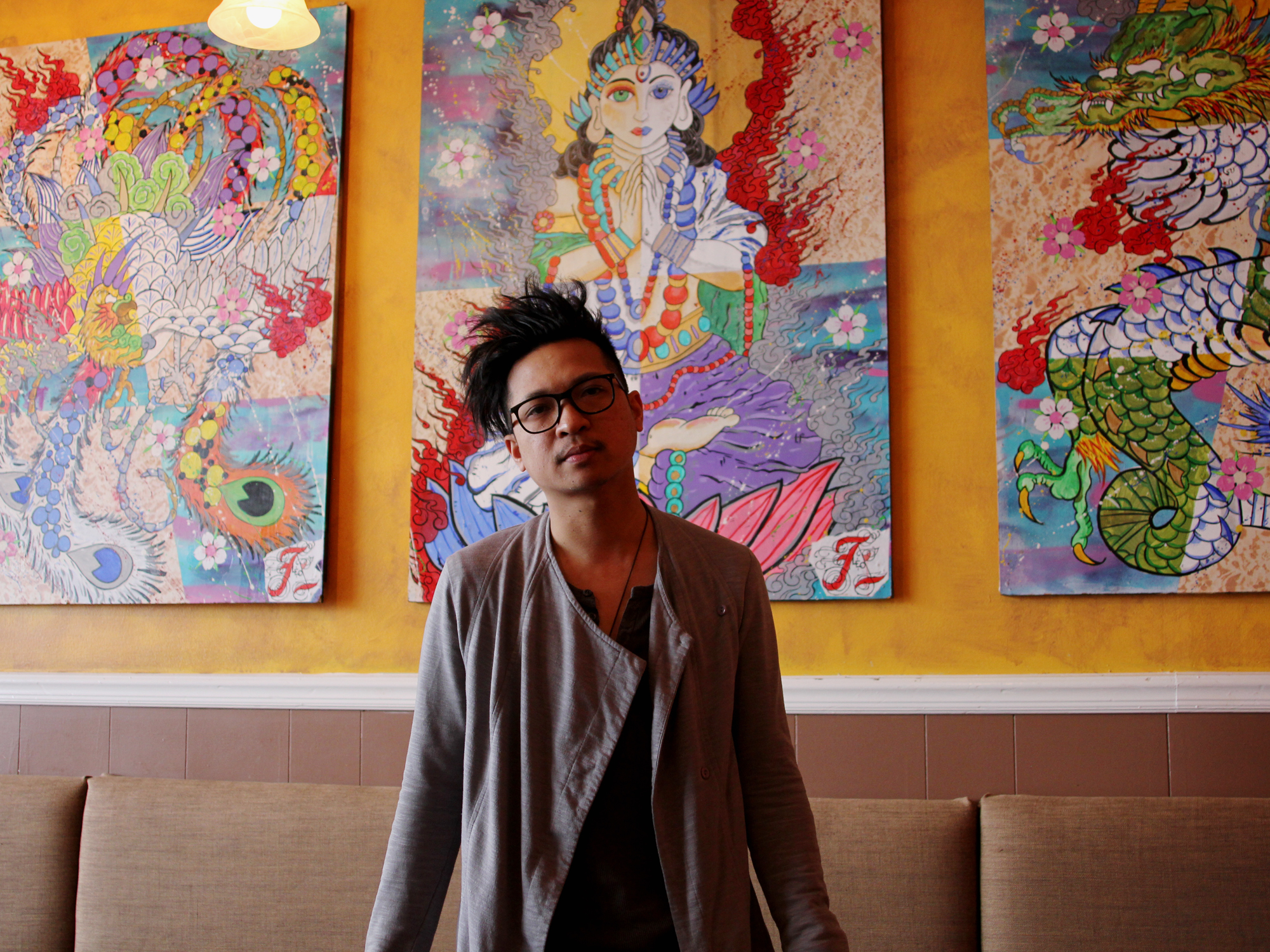TO TALK, WE ROLL SOME OFFICE CHAIRS INTO the middle of a wide open space in Sparrow Coffee’s new, very unfinished facility on Fulton, west of Damen. (Disclosure: Sparrow is an advertiser at Fooditor.) Plywood covering holes in the concrete mark the future placement of a tree and a Japanese garden; the open space beyond us will eventually be a cafe. There’s a tasting and testing lab by the entrance, and some roasting equipment along a wall. But for now the massive building, a former mailbox manufacturer, is empty enough you could hold several separate basketball games at the same time in it. What it mainly holds, is plans for the future.
Sparrow is known for providing coffee to most of Chicago’s Michelin-starred restaurants, and until recently one of those was three-starred Grace, which closed suddenly in December following a long period of dispute and negotiation between owner Michael Olszewski on one side, and chef Curtis Duffy and general manager Michael Muser on the other.
Cooks coming from a restaurant at Grace’s level haven’t found it hard to land other positions in the hot Chicago market, and one of them was talking with Sparrow owner Chris Chacko even before the news about Grace became public—Gray Washburn, a pastry chef who had been a customer of the roastery (which doesn’t typically sell to the public, but has always been happy to nurture relationships with customers from the restaurant community). Chacko says, “He reached out to me when all that was happening. He came at just the opportune time, when I needed some help fine-tuning the waffles.”
The waffles, as you’re about to hear everywhere, are authentic Belgian-style waffles being served at Sparrow’s Naperville cafe, which was under construction at the same time as the new roastery, and just opened a little over a week ago. To judge by a visit last Saturday, it took Naperville one week to figure out that the combination of Sparrow coffee and crispy-outside, chewy-inside Belgian waffles is an essential weekend ritual. Washburn is still refining the recipe, while working on developing an entire in-house pastry program representing Chacko’s exacting sense of pastries worthy of his coffee.
So there’s a whole host of stories to tell—the new roastery, the Naperville cafe, the pastry program that Washburn is working on, that waffle. But I’m here to talk with a different former Grace hand, Matt Danko. It’s his first day at Sparrow, and the plans for why he’s here and what he’s going to be doing at Sparrow are still as unfinished as the plans for the space. But part of it, at least, is an effort to make sure that an important piece of Grace’s future isn’t lost—to Duffy and Muser’s post-Grace aspirations, to Chicago as a food city—just because Grace itself is gone.
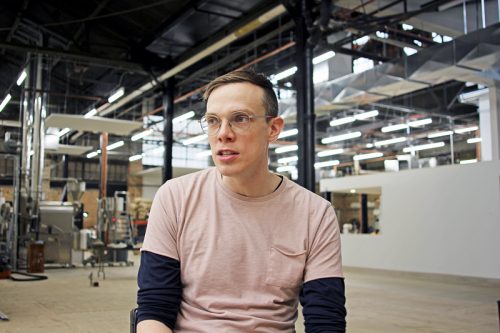
Matt Danko
LANKY, BESPECTACLED, WITH THE PALLOR OF SOMEONE who spends 18 hours a day in the kitchen, Danko grew up in Northfield, Ohio, between Cleveland and Akron. His first real job was working for one of Cleveland’s most acclaimed chefs, Jonathon Sawyer, first at his farm to table gastropub Greenhouse Tavern, and then at his more fine dining restaurant Trentina. “I definitely cut my teeth there,” Danko says. “I didn’t really know much when I walked in the door.” He learned basic kitchen skills, but equally important was “being inspired by chefs—learning how to be creative, how to work in a clean and concise manner.”
He started on the savory side, but after four years he moved into pastry, where he worked for two years. “I felt like it was important for me to learn both sides of the coin, and understand how pastry works, and use that as a skill set going forward. I feel like those techniques are something everybody should know—and I didn’t realize that that wasn’t a path that everyone necessarily took.”
He rose to executive chef at 30-seat Trentina, and along the way he had the opportunity to cook alongside Curtis Duffy at events, including a dinner with Ferran Adria and a Bocuse d’Or dinner at Chef’s Garden. At that point Duffy and Michael Muser were developing plans for future restaurants beyond Grace, and while Danko doesn’t want to speak for Duffy by saying what the chef saw in him at these events, he says they talked quite a bit about the possibility of Danko joining Grace in a management role.
In the end, though, it was the much more casual seafood-oriented cafe Sink/Swim in Logan Square, from the owners of Scofflaw, that brought Danko to Chicago. He helped open it in 2015, but left it at the end of 2016 as it changed its menu approach. (It has since closed.) At last he was at Grace—but Muser admits that they didn’t have a chef de cuisine position in the budget for him at that time. Danko and his wife had to consider whether it was worth the very long hours and relatively modest pay of a crowded fine dining kitchen. “Luckily, she was behind and supportive of me at that moment, which is the first step toward being successful anywhere,” he says.
My skill set was made for a place like Grace, but I didn’t know that until I went there.
“I went in there as a cook, with the ambition that I would work toward the position of c-d-c as it opened. [Duffy] wanted to insert me as c-d-c immediately, but there wasn’t the right path for me,” Danko says. “When I entered the space, everyone who worked there except for a handful of people just thought I was another cook. There was an adjustment period where I was very comfortable, because I was just cooking again, and I felt confident in my skills. But knowing that I would be management one day, I had to kick the door in and just be a little bit better than everyone else.
“My skill set was made for a place like Grace, but I didn’t know that until I went there. That made me feel very comfortable,” Danko says.
For Danko, his future was going to be being the guy behind the guy at Grace—the one trusted with keeping the ship running smoothly as Duffy took an international profile. But Muser describes a future beyond that, which was intertwined with their plans to buy Olszewski out and build an empire of their own: “Restaurant number two, I could totally see, Curtis opens it. But in a year or two, we give the keys to the kid and say, run it, it’s yours,” he says.
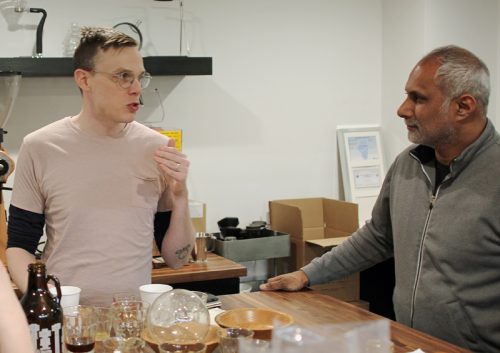
Danko and Chris Chacko
CHICAGO FOODIES WHO FOLLOW THE SPARROW COFFEE Twitter account—most definitely representing Chris Chacko’s personal opinions of what he eats—know that he’s a constant diner (often hitting two or three restaurants in a night) with a mentality that evaluates and reevaluates food to exacting levels of precision. (He often assigns dishes scores on a 100 point scale—down to two decimal points.) His story of how he discovered Danko sounds unbelievable, except coming from him.
“On one of my visits to Grace, I noticed there was a slightly different take on the food,” Chacko explains. A disturbance in the Force! “I knew that it wasn’t Curtis’ food per se, but it had influences. After the meal I asked Valerie [Cao, the sommelier], do you know where this dish came from? And she said, we all develop everything together, but I think it was mainly Matt’s input. And that just struck me, and I kept it in the back of my head.”
Some time later, “I was having a conversation with Michael Muser and Curtis Duffy, and they kept alluding to Matt as being the new protege, the new guy at Grace that they want to make chef de cuisine. And I could taste how unique his food was, how distinctive it was, how precise it was. And then Matt would come by the roasters to buy coffee every couple of weeks or so, and we would just kind of casually have that conversation.”
Then Grace closed. One of the confidants that Michael Muser spoke with when the news came out was Chacko. “We had a long conversation, and at one point I said, ‘What’s Matt doing?'” Chacko asks the question with an urgency that is slightly self-mocking—but you know he really does believe that something of true importance to Chicago’s future hung in the balance, of whether this one kid got poached by New York or San Francisco in the Grace fallout.
“Muser said, ‘I don’t really know,’ and you could tell in his voice that he had concern. That Matt was like family to both Curtis and Muser. So I said, I might be interested” in giving him a job at Sparrow, while Muser and Duffy’s future plans (and the legal issues attached to them) shake out. “Let’s see if I can keep him intellectually interested, a chef of that caliber, but I know that he’s been to the roastery a few times, and I have some ambitions about how I want to elevate my program, so let’s just start talking.”
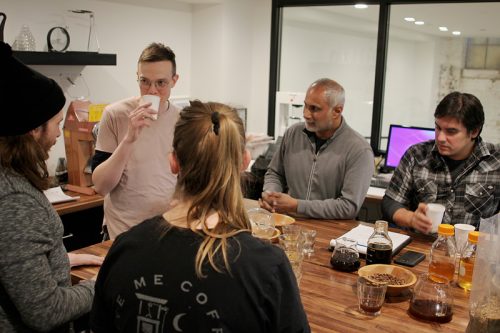
Sparrow team with Cruz Blanca brewer Jacob Sembrano (far right)
“CHRIS CONTACTED ME VERY OPENLY ABOUT the position,” Danko says. “I think he was interested in where we could go together. He has a lot of different plans for this space.”
I ask him what his own plans are. “For me, I think coffee is an interesting route to learning about beverages as a whole, and I like to think it’s another skill set to add to my repertoire. I know there are different food aspirations that Chris has, but right now my biggest interest is bean to bar chocolate. He has a passion for that that I’d really like to learn from.”
“Bean to bar” was a new one to me, too, but it makes perfect sense when you’ve already got a plant full of roasting equipment. “Starting from the cocoa bean here, and roasting it, and distributing it from there, I think that has huge potential,” Danko says. “Chicago doesn’t have a lot of great chocolate right now—there are great chocolatiers [people who make finished items from chocolate produced by others], but making chocolate from beans is something that hasn’t really been explored here. Like roasting coffee, there’s many paths to take. There’s a lot of nuance, a lot of technical skill involved. Technique is always one of the most interesting things about what I do for me, so I think chocolate will fit into that.”
But it’s only halfway through his first day, and for now he’s mainly just learning about coffee—whatever else comes from that, from managing the overall cafe food program to possibly opening a restaurant in the space way down the road (“That’s Phase Five,” Chacko says, waving it well into the future), will start from what he learns about how coffee works. There’s a perfect example of that going on in the lab as we speak—the brewer for Rick Bayless’s Cruz Blanca, Jacob Sembrano, is meeting with Chacko’s staff about some brews incorporating coffee to be showcased at the Uppers & Downers Festival later in the month.
The relaxed, taste-a-little-of-this-and-that atmosphere in the lab is very different from a day at Grace. “We were on a very, very tight schedule. Grace could have been on military time,” Danko says. “We swept the floor every half hour—our day was allocated in five minute increments. We all knew what we were there to do, and we were all dedicated to that. It is interesting now to spend an hour talking about something. Actually having coffee, or going to lunch, or any of this stuff is not normal. I mean, right now it feels like I’ll never get used to it.”
On this first day, there are many possibilities ahead, some of which could involve working with Duffy and Muser again, some of which will take him on his own path. That recognition leads Danko to wax a little nostalgic for the future at Grace which might have been and now won’t, at least not under that name.
“Grace closes and all these chefs are out in the wind, nobody wants to work anywhere because they know how special Grace was as a culture,” he says. “I honestly believe that if there were some magical world where the events that happened in December hadn’t happened, it could have gone on for a long time. I think the team that was there was happy, for the most part, and they could have pushed it a lot further. Which is ultimately the saddest part. In that year that I was there, Curtis and I barely got started. It would have been two or three years before something really substantial would have happened.
“So now we’re here, and that place doesn’t even exist any more,” he says. “That was what I feel like I missed out on, the opportunity to make Grace even better, and give a lot of the guys who ended up having to leave because of the closing a chance to turn into management, or work on dishes, or expand and grow with us. Even though Grace was great, we had to walk away from a lot of potential, and that’s what’s frustrating,” he says.
And then we roll our chairs across the concrete floor, past the future site of a Japanese garden and a tree. And we go into the lab to taste what can be done, not with A5 Miyazaki and matsutake mushrooms, but with beer and coffee.
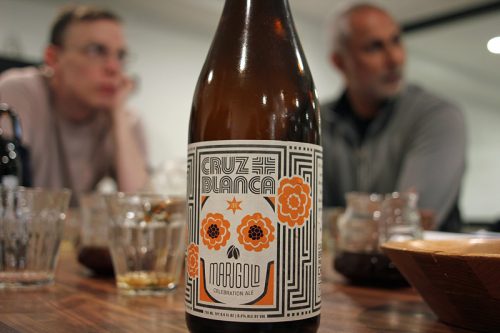
Michael Gebert is chief coffee drinker of Fooditor.
Latest
Join the Discussion
After you comment, click Post. If you're not already logged in you will be asked to log in or register with Disqus.




